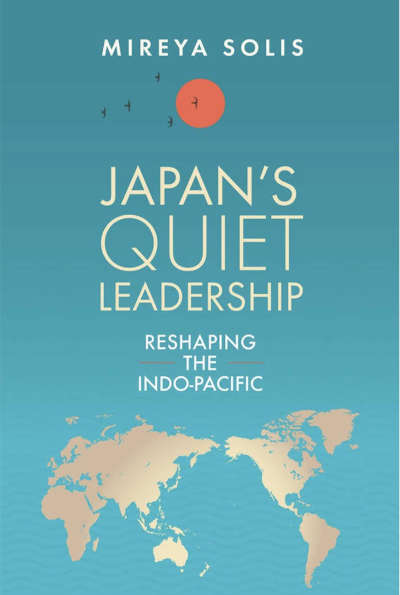In the picture
Cover of Mireya Solis' book 'Japan's Quiet Leadership. Reshaping the Indo-Pacific' (Washington: Brookings Institution Press, 2023) 245 pp.
Economic stagnation and demographic contraction do not help Japan's chances of international leadership, but as these characteristics threaten to become generalized among the great powers - minimal GDP growth and fees fertility below population replacement - other elements of the rising sun nation's geopolitical traits are revalued.
Mireya Solis, director of the Center for East Asia Policy Studies at the Brookings Institution, a think-tank at reference letter in Washington, believes that Japan's ability to establish a relevant relationship with all the main players in the Indo-Pacific gives it a special position in the region. He describes the country as "network power per excellence", because "at the heart of Japan's economic and diplomatic influence is a strategy of connectivity". Thus, Japan is the first Economics of the trans-Pacific trade agreement (CPTPP), participates with China in the regional economic association (RCEP), maintains close relations with India and Australia (Quad) and has been bringing its vision of a Free and Open Indo-Pacific (FOIP) closer to the ASEAN countries; it also cooperates with the United States in some of these initiatives and is Washington's greatest ally in the area. Solis disagrees that we are properly in a process of de-globalization, but although international networks may be recalibrated, "they will remain a formidable asset" for the Japanese. "This makes Japan more, not less, relevant for what is to come," he concludes.
To support this idea, the author does not use geography, but if we take a world map we see that Japan is in the middle of the Pacific arc that runs from New Zealand and Australia to Mexico, or also - like core topic - in the center of the even wider arc of the Indo-Pacific, from East Africa and India to Central America. Such a position invites participation in whatever networks are formed in the region, especially at a time when Japan is expressing a desire to 'normalize' its projection in the world.
Solís' book analyzes both economic conditions and Japan's domestic political framework and foreign policy in recent decades. As the author points out, the 'lost decades' that put an end to a Japanese industrial expansion that in the 1980s made the United States fear for its supremacy are today an object of learning for other countries about how to manage slow economic growth and deflation. The measures put in place by Shinzo Abe between 2012 and 2020 - 'abenomics' - set up some instructions to partially get out of the quagmire, although the huge debt Issue and modest growth continue to hold back a more evident take-off of the country.
Less well known to non-specialists in Japan are the coordinates of its national politics, and Solis makes a detailed presentation of the party system and its principles of action. For example, he explains the succession of prime ministers with terms of only a few years by the existence of factions within the Liberal Democratic Party, which has ruled the country almost uninterruptedly, and by the reduced powers of the position, compared to other countries.
In terms of international policy, the book reviews the various 'doctrines', such as that of Shigeru Yoshida, who in the post-war era strictly adhered to constitutional limitations on subject security and defense; that of Takeo Fukuda, who in the 1970s favored economic attendance and trade ties with the Asian neighborhood to allay fears of the country's great development ; or that of Shinzo Abe, who sought ways to overcome the constrictions at subject of 'self-defense' and proposed the regional vision of the Free and Open Indo-Pacific as a way to address with other countries the rise of China. The 'diplomacy of new realism' of Fumio Kishida, the current prime minister, pushes for Japan to adopt a more traditional military role, with an increase in defense expense that doubles the old limit of 1% of GDP.
Solis believes that Japan will continue on this course of 'normalization', although the steps will be gradual. On the one hand, the alliance with the United States will continue to be the basis of the country's security; on the other, it will be the evolution of social perception that will allow progress toward greater defense autonomy. "Japanese public sentiment has not abruptly transformed from pacifism to realism," the author warns, but one could speak of a "hardened pragmatism" when describing the national mood, as the population also understands that the global context is one of growing antagonism.

